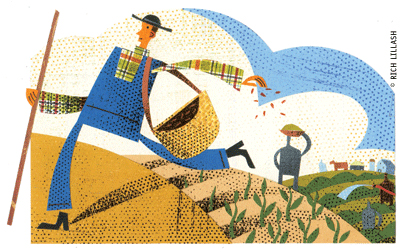
Class of ’02 | Three years ago, Dr. Rajiv J. Shah M’02 GrW’05 found himself in the same room of the Élysée Palace with Bill Gates and former French President Jacques Chirac. Having worked for the Bill and Melinda Gates Foundation for the past six years—he is now its director of agricultural development—Shah cites that meeting, convened to discuss global health initiatives, as a watershed in his career as a policy analyst and advocate.
“Seeing someone like Bill Gates—who has the resources and the ability to work with world leaders—really serving as a voice for the poorest and least fortunate people in the world has been very inspiring,” Shah says. And what’s more, “it really makes a difference.”
As a global food crisis looms, the Gates Foundation has turned to investment in agriculture as a means to reaching the world’s 840 million hungry people. The large majority of these people rely heavily on small-scale agriculture to meet their daily energy needs; for this population, when a nearby farm’s crop is damaged or destroyed, the results are catastrophic—and often fatal.
Shah has overseen the Gates Foundation’s spending on agricultural development since the program’s inception four years ago. With a focus on parts of Asia and most of sub-Saharan Africa, their spending aims to facilitate small farmers’ links to markets; boost productivity via seed, irrigation, and soil-health strategies; and explore the development of genetically engineered crops that have enhanced nutritional value or are drought- and disease-resistant.
The work has carried Shah across the globe, and it all started with a volunteer trip to rural India while he was an undergrad at the University of Michigan. It was his first trip taken without the guidance of family to the native country of his parents, who’d come to America before Shah was born to pursue higher education in their respective fields. As an intern, Shah travelled with a group of doctors as they visited families door-to-door, dispensing medications, conducting leprosy screenings, and helping to organize small microenterprise projects. He was shocked by the rampant malnutrition and poor economic conditions.
“Before that trip, it had never occurred to me that people could live in such destitute circumstances,” says Shah.
When he returned, he intended to pursue a degree that could help him change the lives of people like the ones he’d met in India. He ended up in Penn’s unique—and challenging—joint M.D./Ph.D. (in economics) program. Between classes he co-founded Project IMPACT for South Asian Americans, a nonprofit organization that encourages grade-school and university students to become engaged in civic and community organizations.
In 1999, he was invited to join Al Gore’s presidential campaign as the candidate’s health-care policy advisor. He took a year off from his studies, moved to Nashville, worked 16-hour days, got married, and “fell in love with politics.” The love affair did not lead to a job, however—since, as Shah says with a laugh: “You are no doubt familiar with what happened on election night.”
But soon after he completed his medical degree at Penn, a former colleague from the Gore campaign encouraged him to accept a short-term analyst position at the Gates Foundation. It was supposed to last six months.
Six years later, Shah (now the father of two small children) has made a life for himself and his family in Seattle, home of the Gates Foundation. He served first as deputy director of policy and finance for the foundation’s global-health program, helping to raise over $5 billion for the Global Alliance for Vaccines and Immunizations (GAVI), an initiative that began funding childhood-immunization programs worldwide in 1999. He then led the brainstorming process that spawned the foundation’s agricultural investments.
Through those investments, Shah hopes to help break the cycle of hunger and poverty once and for all: a lofty goal that he believes can be achieved with the right mix of public and private engagement and investment.
“We can use our lives to create positive change in the world,” Shah says. “The first step is learning about the issues. Become an advocate in your own community, or use a vacation to volunteer abroad. It all starts with education.”
—Rachel Estrada Ryan C’00

